Inauguration
$6 Million Gift From Local Technology Companies Lays Groundwork for UCI's Rise as Science and Technology Leader.
The University of California, Irvine (UCI) and two of Orange County's top high-technology companies announced the launch of a new research center during a special event held on June 19, 2000. The foundation for the new partnership was a gift of $3 million each from two traditional high-tech rivals, Broadcom Corp. and Conexant Systems, Inc. Due to their foresight and generosity, the new Center for Pervasive Communications and Computing (CPCC) is poised at the forefront of research in emerging communications technologies that will dramatically change the way people access and use information.
During the inaugural event, held at the UCI campus, California Governor Gray Davis, the UCI Chancellor and top executives from both companies remarked upon the opportunities available due to this historical alliance among industry, the university and the state.
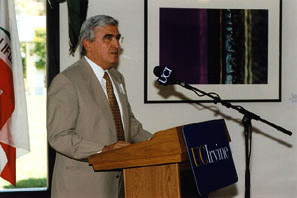
Nicolaos G. Alexopoulos, Dean, The Henry Samueli School of Engineering
The Dean opened by saying, "Today you will witness the launch of a new center of research and education, which is destined to play a dominant role in the technological landscape of the future."
He then described his vision for building The Henry Samueli School of Engineering into a leading edge research and education institution. Corporate partnerships, noted Alexopoulos, such as the one creating the CPCC, are vital to his goal to hire the very best students, researchers, and faculty. Industry involvement also helps the school ensure its curriculum maintains its relevancy.
"This gift enables us to educate the next generation of leaders and to help shape the future of communications and computing technologies," said Alexopoulos.
The gift will also help the Samueli School compete against more established engineering programs nationwide for talented students and faculty.
"One of the objectives of the school is to create a well-trained work force for the companies of Orange County," Alexopoulos added."Another is to provide area companies with access to faculty expertise. Achieving both of these goals adds to the economic base of the county and, ultimately, the state."
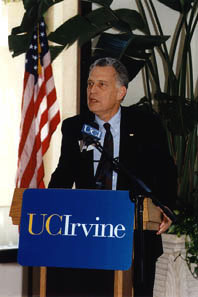
Ralph J. Cicerone, Chancellor, UC Irvine
The Chancellor commended executives of both companies for their support of UC Irvine. He noted that the gift is a critical stepping stone toward UCI becoming one of the leading research universities in California in the field of communications and computing.
The Chancellor also touched on UCI's relative youth in the UC system, its enviable environment and its place as home to the winners of the 1995 Physics and Chemistry Nobel Prizes. He closed by saying he looks forward to growing telecommunications and information technology research on campus.
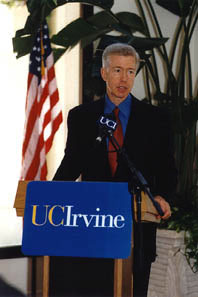
Gray Davis, Governor, State of California
The Governor unveiled his vision for making California--the 5th largest economy in the world--even more strong and prosperous by investing state money in research. The Governor's belief in centers like the CPCC is closely tied to his larger vision of creating four California Institutes for Science and Technology, which he also announced during the ceremony. The Governor described his plan to create centers of innovation to lead technology development and to drive the California economy to new heights. He plans to award competitive multi-million dollar grants to create these new institutes. The Governor envisioned the end result would help bring prosperity to California, the nation, and the world.
He noted that the $6 million gift to UCI would give the school "a leg up" in competing for the state grants. The Governor closed by saying that the model of industry gifts and matching university support is a successful one, and he wished the CPCC much success.
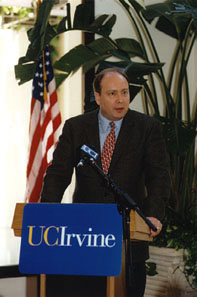
Dwight Decker, Chairman and CEO, Conexant Systems, Inc.
Dr. Decker began his remarks by underscoring the importance of this partnership to the success of his company.
"Talent development is critical to Conexant and to other companies in Southern California's high-tech business community," he said. "With the establishment of the Center for Pervasive Communications and Computing, we have the opportunity to create a talent incubator for area businesses that leverages a unique partnership between UCI and leading communications companies."
He then talked about the emerging communications technologies that companies like Conexant are developing. With the integration of voice, data, computers and communications, coupled with the availability of huge amounts of bandwidth, Decker envisions wireless technologies will make profound changes on our lives. The trend will continue since the semiconductor industry will keep shrinking integrated circuits at the same rate they have been doing for decades. The resulting availability of intelligence in chips will make higher speed communication possible. This, in turn, will drive computation and communication anytime, anywhere. And not only between humans, but also between machines and humans, and between machines.
Decker closed by saying that the CPCC is uniquely positioned to serve as a launch point for many of these emerging technological developments.
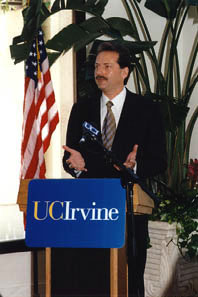
Henry Samueli, Chief Technology Officer and Co-Founder, Broadcom Corp.
Dr. Samueli opened by sharing a bit of Broadcom's history. When Broadcom outgrew its former facilities in Los Angeles, Samueli explained, they looked for a good place to breed a great technology company. They chose Irvine because of the key ingredients it provided. Irvine is a high-technology enclave where scientists, engineers and technicians feel comfortable living and working. Once such a community gets started, it tends to snowball--attracting more high-tech companies and more skilled employees. Samueli anticipated seeing the high-technology factor in Irvine continue to evolve, as the city already is home to numerous technology companies, a well-educated population and UCI.
"Broadcom believes that having a world-class university nearby is absolutely critical to this region's growth as a high-tech center for excellence," he said. "The Center for Pervasive Communications and Computing will create a large pool of well-trained students in communications and networking for the local community, as well as become a breeding ground for new technology companies. Our educational alliance will give UCI the initial tools and resources for establishing a progressive educational institution to attract world class faculty for the advancement of wireless and broadband communications."
A product of the UC-system, both as a former student and a former professor, Samueli considers it one of the greatest university systems in the world and is sure UCI will follow the footsteps of great UC technology research campuses. He stressed that it has all the necessary ingredients: a great location, great infrastructure and close proximity to innovative high-tech companies.
Closing Q&A and Remarks
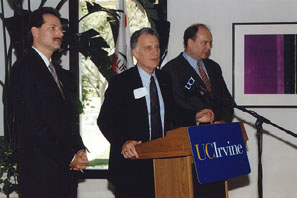
The invited speakers were followed by a Q&A session, during which the Chancellor stated his pride and excitement about UCI having been chosen to house this one-of-a-kind research center. He expects the center to generate a great educational benefit to the community. He also reiterated his earlier remarks about the center supporting the creation of unique intellectual property and spawning new ventures that will hopefully be as successful as Broadcom and Conexant.
During the Q&A, attendees asked whether other companies would be welcome to join the CPCC.
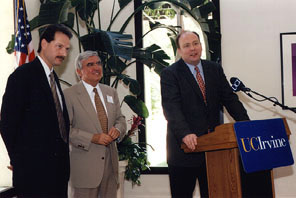
Decker fielded the question, explaining that the center is part of the public domain and open to new membership. He noted that the intellectual property created in the center would be of benefit to everyone involved. As examples, he cited Hewlett Packard, Agilent, Sun, Cisco, and even Intel as companies that traced their roots back to the public domain research conducted at Stanford University. The resulting intellectual property increased the strength of Northern California's economy for all the parties involved. Decker concluded by noting that the CPCC has been designed along the lines of the Northern California model and he expects it to achieve similar technological success in the areas of telecommunications and information technologies.
Most attendees left the event with the sense they had witnessed the beginning of something significant. And they had. They had seen disparate and sometimes contentious elements--industry, the university and state--meld together to form a greater whole.
Industry contributed to this result by offering the funding necessary for the university to "grow" a center of excellence--not only in education, but also in research and intellectual property development. The university matched the effort by providing the resources--human capital and infrastructure--to make the center viable. And, in turn, the Governor pledged support for the CPCC--and for new state-supported centers of innovation.
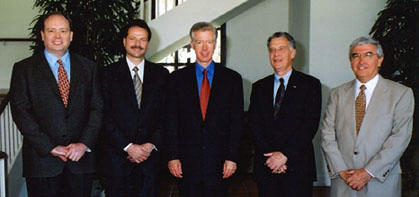
(Only six months later, the Governor announced that one of the new state- supported centers, the California Institute for Telecommunications and Information Technology [Cal-(IT)2], would be housed on the campuses of UCI and UCSD. It seems the CPCC was "a leg up" needed to attract $100 million in research support to another unique partnership: a joint effort of UCI and UCSD.)



